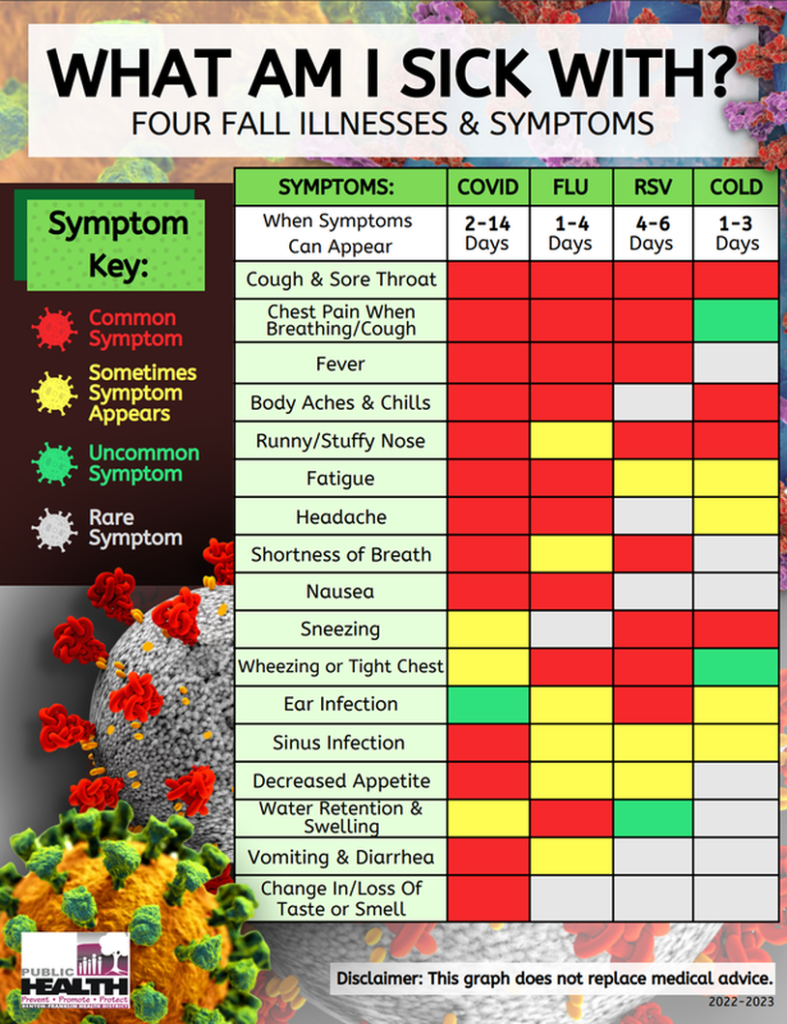
Symptoms
What if you test positive for COVID-19?
If you test positive for COVID-19, stay away from others as much as possible until your symptoms improve. Most people can treat their symptoms at home without medical intervention but contact your healthcare provider if you experience severe symptoms or you are concerned.
If you are sick with COVID-19 or another respiratory illness, stay home until (1) your symptoms are improving AND (2) you are fever free for 24 hours without using fever reducing medication.
After a positive test result, you do NOT need to test negative to be around others. You may test positive for several weeks after you are contagious.
You can report your positive test to your local public health office. Call 509.243.3344 to speak to someone at Asotin County Health District. Consider letting people you had close contact with know about your positive test result.
You can tell your symptoms are improving when you start to feel better and you feel well enough to fully participate in your activities, such as learning in a classroom or completing tasks at work. A respiratory virus infection can have many types of symptoms, some of which can last beyond when someone is contagious (able to spread the virus), such as a lingering cough. Having a single symptom or a combination of symptoms is not as important as the overall sense of feeling better and the ability to resume activities.
When you go back to your normal activities, wear a mask and take added precautions over the next 5 days, such as taking steps to improve air flow and filtration, practicing good hand hygiene, cleaning regularly, physical distancing, and testing when you will be around other people indoors. You may still be contagious with a respiratory virus after returning to your normal activities, so it is important to take additional precautions.
- People with COVID-19 are often contagious for 5-10 days after their illness begins.
- People with flu may be contagious for up to 5-7 days after their illness begins.
- People with RSV are usually contagious for 3-8 days after their illness begins.
Some people, such as those with a weakened immune system, can be contagious with a respiratory virus for longer periods of time.
What if you test negative for COVID-19?
If you have respiratory virus symptoms that are not better explained by another cause (such as allergies) and do not test positive for COVID-19, you should isolate away from others. You can leave isolation when both of the following have been true for at least 24 hours:
- Your symptoms are getting better overall AND
- You have not had a fever (and are not using fever-reducing medication).
When you leave isolation, wear a mask and take added precautions over the next 5 days, such as taking steps to improve air flow and filtration, practicing good hand hygiene, cleaning regularly, physical distancing, and/or testing when you will be around other people indoors.
When should you test for COVID-19?
You should consider testing for COVID-19 if you have symptoms of COVID-19, even if they are mild.
If you were exposed to someone with COVID-19 but did not develop symptoms, do not test for at least 5 days. You do not need to test for COVID-19 if you do not develop symptoms. However, there are some circumstances, you may want to test even without symptoms (such as visiting someone with a compromised immune system or going to a large event).
False negative results are possible, especially in the early stages. If you continue to have symptoms after a negative COVID-19 test, consider retesting in 24-48 hours.
False negative and false positive test results
False positives are very rare. At home COVID-19 tests are accurate for positive results and you do not need to retest.
False negatives happen more often. You can get a false negative if you test too early. In some cases, a person will not test positive on a home test at all. If you believe you might have a false negative, you can retest or contact your health care provider about a PCR test. PRC tests are much more sensitive than home tests.
If you get a negative test and continue to have symptoms, consider retesting in 24-48 hours.
